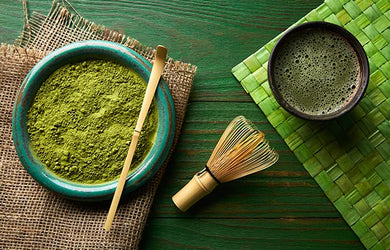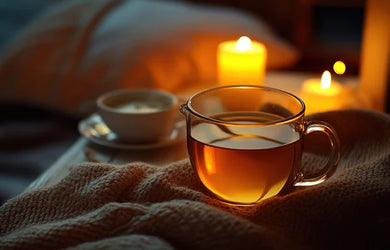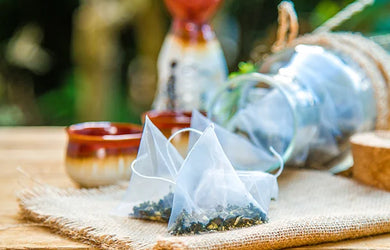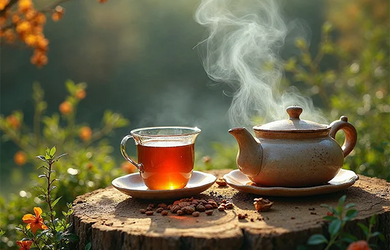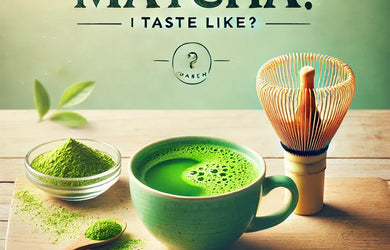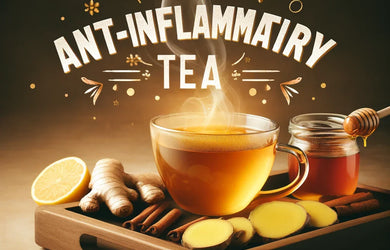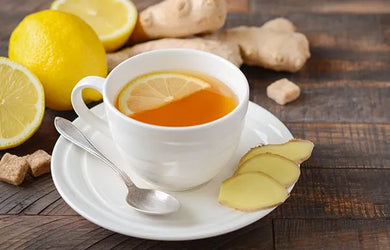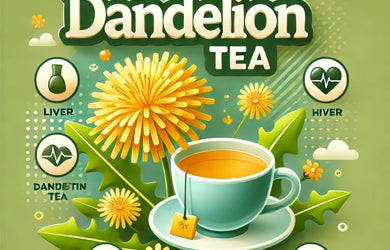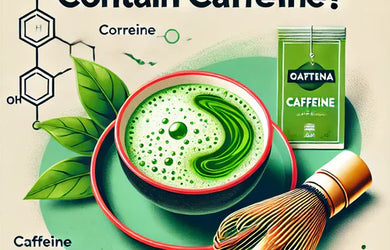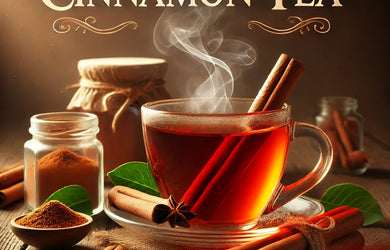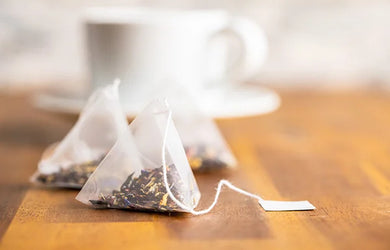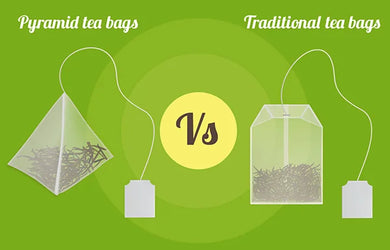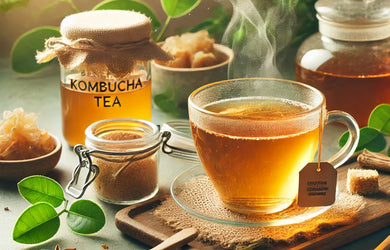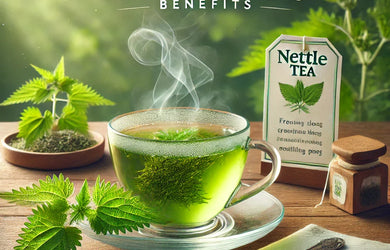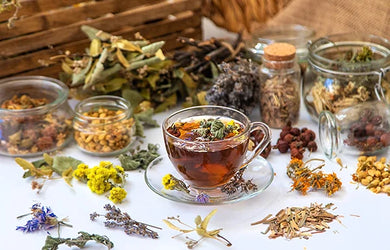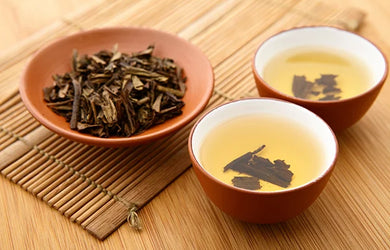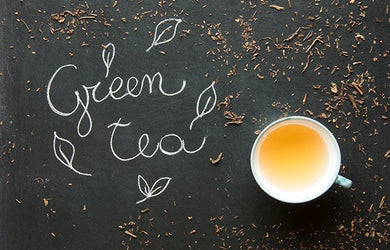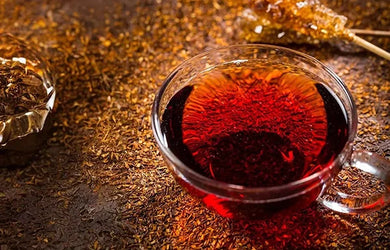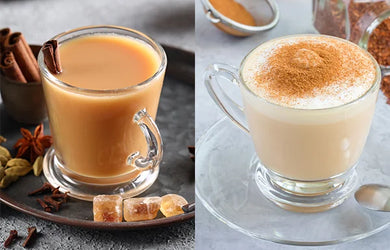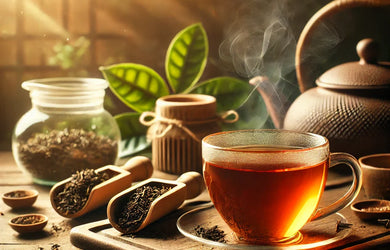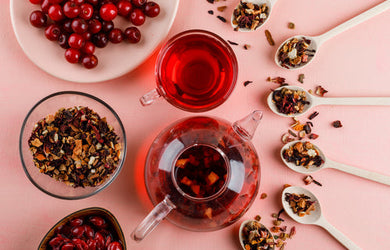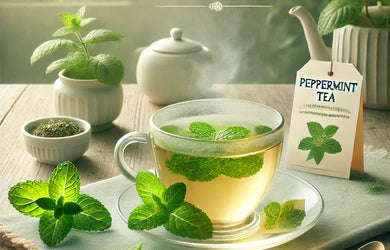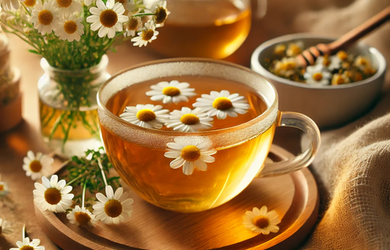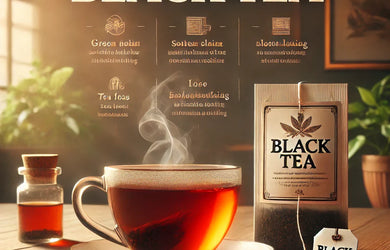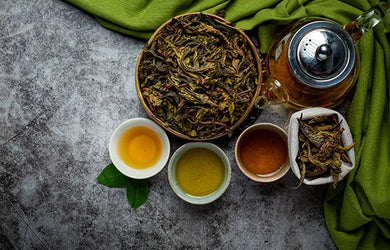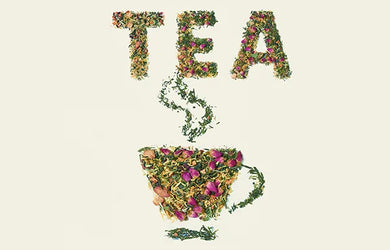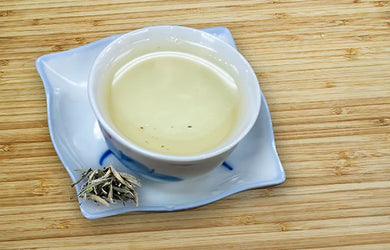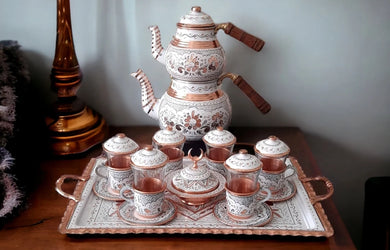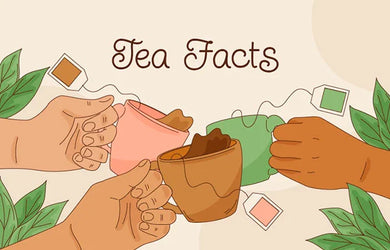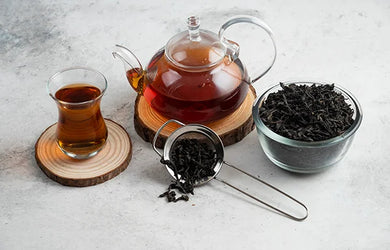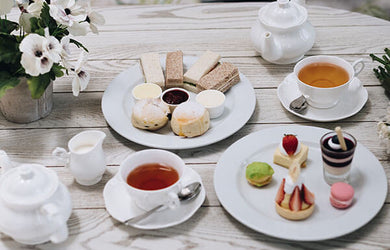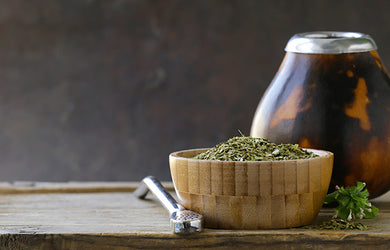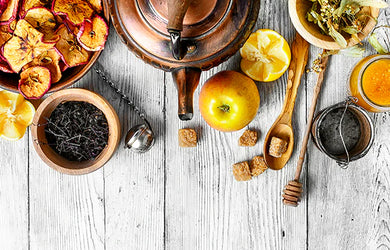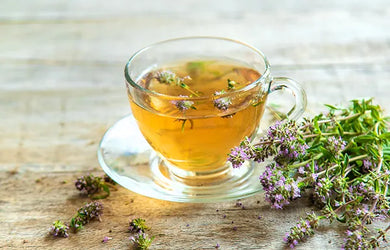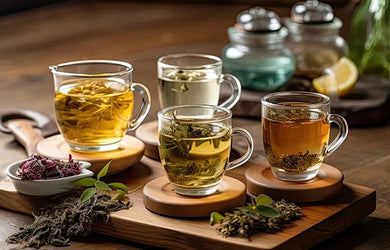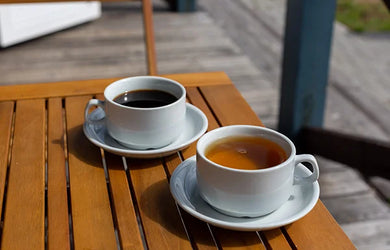one source, two very different drinks. both green tea and black tea come from the same plant, yet they couldn't be more different as a drink. the way the leaves of each variety are processed after picking defines everything from colour and caffeine to how it tastes.
when it comes to choosing between green tea vs black tea, most people prefer one over the other for various reasons. some can only have green tea in the morning, while others won't touch anything but a strong black tea.
the oxidation process creates two entirely distinct experiences, each with its own character and health profile. this guide breaks down the green tea vs black tea comparison, so you can make an informed choice next time you're brewing.

what is green tea?
green tea gets its name from the colour of the tea leaves. after the leaves are picked, they're quickly heated – either pan-fired or steamed. this is to stop oxidation before it begins to affect the leaves. this keeps the leaves green and preserves their delicate, vegetal flavour.
you get a lighter drink with a flavour profile that can range from sweet and vegetal to slightly nutty. chinese varieties like mao feng tend toward a gentler, more delicate character. japanese green teas often carry marine or umami notes from steaming. if you want to enjoy some top-quality green tea, try mao feng green tea bags or green mint tea bags. you’ll get exactly that – whole leaves, no dust – just proper tea in quality green tea bags.
what is black tea?
black tea undergoes full oxidation, which is the key difference when comparing black tea vs green tea. after picking, the leaves are rolled and left to fully oxidise. this turns them dark and develops those rich, malty, and sometimes caramel-like notes. the flavour tends to be bolder and more robust.
from the hills of darjeeling to the lowlands of assam, each region produces black tea with a distinct personality. options like chai tea, darjeeling earl grey tea, everyday brew or the english breakfast tea are probably the most familiar – strong enough to handle milk and equally outstanding without it. try some top-quality black tea bags from teapigs and see which one you like the most.
nutritional differences: green tea vs black tea
when it comes to their overall experience, comparing black tea vs green tea and understanding the nutritional differences is essential.
green tea
taste: before we compare the taste of green tea vs black tea, it helps to know what makes this one distinct. the taste of green tea can be somewhere between grassy and sweet. the flavour depends entirely on where it comes from and how it's made. japanese varieties tend to be vegetal in taste – something like steamed greens, seaweed or even a faint marine quality.
chinese versions tend to be nuttier and toastier. some teas taste sharp, and others creamy and smooth. you may also notice the umami richness. it comes from an amino acid called l-theanine, especially in shaded teas like gyokuro.
processing: the whole green tea vs black tea debate really starts in processing. green tea processing stops oxidation almost immediately after picking. that's what keeps the leaves green. two main methods exist – steaming and pan-firing.
japanese tea producers mostly steam their tea – quick, 30 seconds to two minutes – which locks in that vegetal character. chinese tea producers prefer pan-firing. this involves tossing leaves in hot woks or drums, which brings out toasted and nutty notes.
after fixation comes rolling, which shapes the leaves and breaks cell walls so water can extract flavour when brewed. then drying, reducing moisture to around 5%.
flavour: when people ask about green tea vs black tea flavour profiles, green tea's lighter character becomes obvious. there's grassiness, obviously. pan-fired teas taste nuttier. shaded varieties have umami notes. sweetness appears when you brew it right.
texture matters as much as taste. some tea varieties feel sparkling and brisk in the mouth, others creamy or smooth. matcha, which is ground from whole leaves, is thick and intense. sencha is brighter, more straightforward. longjing tastes toasted, almost like chestnuts. the flavour shifts depending on cultivar, terroir and harvest time. just remember that good green tea should taste clean and balanced, not harsh or overly bitter.
caffeine content: the caffeine debate in green tea vs black tea often surprises people. green tea contains just 30 to 50mg per cup. matcha's an outlier – because you consume the entire ground leaf, it can have 60 to 80mg per serve. whether you choose green tea or black tea, caffeine levels always vary.
how much caffeine you get in green tea vs black tea depends on the tea type, brewing temperature and steeping time. hotter water and longer brewing extract more caffeine. younger leaves and buds contain higher levels than older and more mature leaves.
japanese green teas like sencha typically have around 30 to 40mg per cup. the caffeine works differently here, too. l-theanine modulates its effects, giving calm focus instead of that anxious buzz.
health benefits: looking at green tea vs black tea for health benefits, green tea's reputation isn't a marketing gimmick. research points to genuine benefits, mostly from catechins – particularly egcg. these polyphenols act as antioxidants, hunting free radicals and reducing oxidative stress. studies suggest regular consumption may lower cardiovascular disease risk and support brain function.
the anti-inflammatory properties show promise for cognitive decline prevention. some research links green tea to improved cholesterol levels and blood pressure. drinking 3 to 5 cups daily appears optimal for benefits without overdoing caffeine.
black tea
taste: on the other side of black tea vs green tea, the black one’s taste is noticeably bolder. there's a malty quality – like toasted grain – especially in assam varieties. indian black teas are usually robust and full-bodied.
chinese versions feel smoother and less intense. you'll find notes of honey, dried fruit and sometimes floral, depending on origin. darjeeling tastes lighter with muscatel notes. ceylon has brightness with citrus undertones. the body feels heavier, more substantial in your mouth. astringency exists, but it's softer, rounder. steep it too long and bitterness builds up. but done properly, black tea tastes warm and satisfying. it pairs really well with milk without losing character.
processing: on the black tea side of the green tea vs black tea comparison, oxidation is the defining step. both come from the camellia sinensis leaves, but a lot changes after that. leaves are withered first, losing moisture until they're pliable. then comes rolling, either by hand or machine, which breaks cell walls and releases enzymes.
this is where oxidation begins. the rolled leaves are exposed to air for anywhere from 45 minutes to three hours. enzymes react with oxygen, transforming catechins into theaflavins and thearubigins – compounds that give black tea its dark colour and distinct flavour. finally, drying with hot air stops oxidation and reduces moisture to around 3%.
flavour: flip the green tea vs black tea comparison, and the flavour difference becomes obvious. black tea has warmth and depth. malty notes dominate, especially in assam tea. there's sweetness hiding underneath – caramel, sometimes honey.
texture matters. black tea feels fuller and more robust. there's more body to it – it lingers instead of fading away. chinese black teas taste toasted and almost nutty. indian varieties are bold and brisk. ceylon has a clean finish.
caffeine content: generally, the caffeine content in black tea vs green tea is more. black tea generally contains 40 to 70mg per cup. the oxidation process concentrates caffeine slightly, and black tea leaves are typically brewed hotter and longer, extracting more. assam can reach 90mg.
in the caffeine content understanding of black vs green tea, it’s worth remembering that brewing matters enormously. water temperature, steeping time and leaf grade all affect the final number. but there's functional similarity despite the difference. black tea still delivers a steadier energy boost than coffee, though without quite the same l-theanine modulation. for those choosing green tea or black tea based on lower caffeine, even decaf versions exist.
health benefits: when comparing the health benefits of black vs green tea, black tea holds its own! oxidation creates theaflavins and thearubigins – polyphenols with strong antioxidant properties that rival green tea's catechins.
studies link regular black tea consumption to improved cardiovascular health, particularly better cholesterol levels and reduced stroke risk. the anti-inflammatory effects show promise for heart disease prevention. some research suggests cognitive benefits – improved attention and alertness, likely from the caffeine and l-theanine combination.
additionally, antioxidants fight oxidative stress and free radical damage. blood pressure may improve with consistent consumption. two to three cups daily appear optimal. just remember – the benefits are real, just not miraculous.
conclusion
green tea vs black tea isn't about picking a winner. they're the same plant processed two different ways, and that changes everything – taste, caffeine, even how your body responds.
green tea stays light, vegetal and packed with catechins. black tea becomes bold, malty and rich in theaflavins. both offer outstanding taste and real health benefits. both contain caffeine, though in different amounts.
try both and see which one works best for you. green tea might suit quieter moments, while black tea when you need something fuller. but don't let stereotypes choose for you – let your taste and health goals decide.
faqs on green tea vs black tea
q. which is better, green tea or black tea?
a. the green tea vs black tea debate has no clear winner – it depends on what you need. green tea offers higher catechins and calmer energy from l-theanine. black tea provides stronger caffeine and theaflavins for heart health. both provide antioxidants and wellness benefits. so, the best depends on your taste preference, caffeine tolerance, and how your body responds.
q. which tea is the healthiest?
a. in the green tea vs black tea comparison, green tea edges slightly ahead on antioxidant content. especially, egcg catechins, which are linked to brain and heart health. black tea's theaflavins offer comparable cardiovascular benefits, though. green tea or black tea – both provide genuine wellness support. consistency matters more than minor compound differences. so, choose black vs green tea based on your preferences.
q. what is the difference between green and black tea?
a. the difference in green tea vs black tea comes down to processing. both come from camellia sinensis, but green tea stops oxidation immediately through steaming or pan-firing. this keeps the leaves green and flavour vegetal. black tea oxidises fully for hours, turning leaves dark and creating a malty and robust flavour. this changes caffeine levels, antioxidant types, taste and body. same plant, different drinks.
q. is green tea better than black tea for fat burning?
a. looking at green tea vs black tea for fat burning, green tea shows slightly better results in studies. that’s mainly due to egcg catechins combined with caffeine boosting metabolism slightly. that said, the theaflavin content is higher in black vs green tea. and that can also support weight management.









